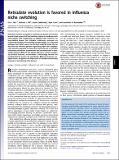Reticulate evolution is favored in influenza niche switching
Author(s)
Ma, Eric Jinglong; Hill, Nichola; Zabilansky, Justin R.; Yuan, Kyle; Runstadler, Jonathan
DownloadMa-2016-Reticulate evolution.pdf (648.0Kb)
PUBLISHER_POLICY
Publisher Policy
Article is made available in accordance with the publisher's policy and may be subject to US copyright law. Please refer to the publisher's site for terms of use.
Terms of use
Metadata
Show full item recordAbstract
Reticulate evolution is thought to accelerate the process of evolution beyond simple genetic drift and selection, helping to rapidly generate novel hybrids with combinations of adaptive traits. However, the long-standing dogma that reticulate evolutionary processes are likewise advantageous for switching ecological niches, as in microbial pathogen host switch events, has not been explicitly tested. We use data from the influenza genome sequencing project and a phylogenetic heuristic approach to show that reassortment, a reticulate evolutionary mechanism, predominates over mutational drift in transmission between different host species. Moreover, as host evolutionary distance increases, reassortment is increasingly favored. We conclude that the greater the quantitative difference between ecological niches, the greater the importance of reticulate evolutionary processes in overcoming niche barriers.
Date issued
2016-04Department
Massachusetts Institute of Technology. Department of Biological Engineering; Massachusetts Institute of Technology. Division of Comparative MedicineJournal
Proceedings of the National Academy of Sciences
Publisher
National Academy of Sciences (U.S.)
Citation
Ma, Eric J. et al. “Reticulate Evolution Is Favored in Influenza Niche Switching.” Proceedings of the National Academy of Sciences 113.19 (2016): 5335–5339. © 2016 National Academy of Sciences
Version: Final published version
ISSN
0027-8424
1091-6490